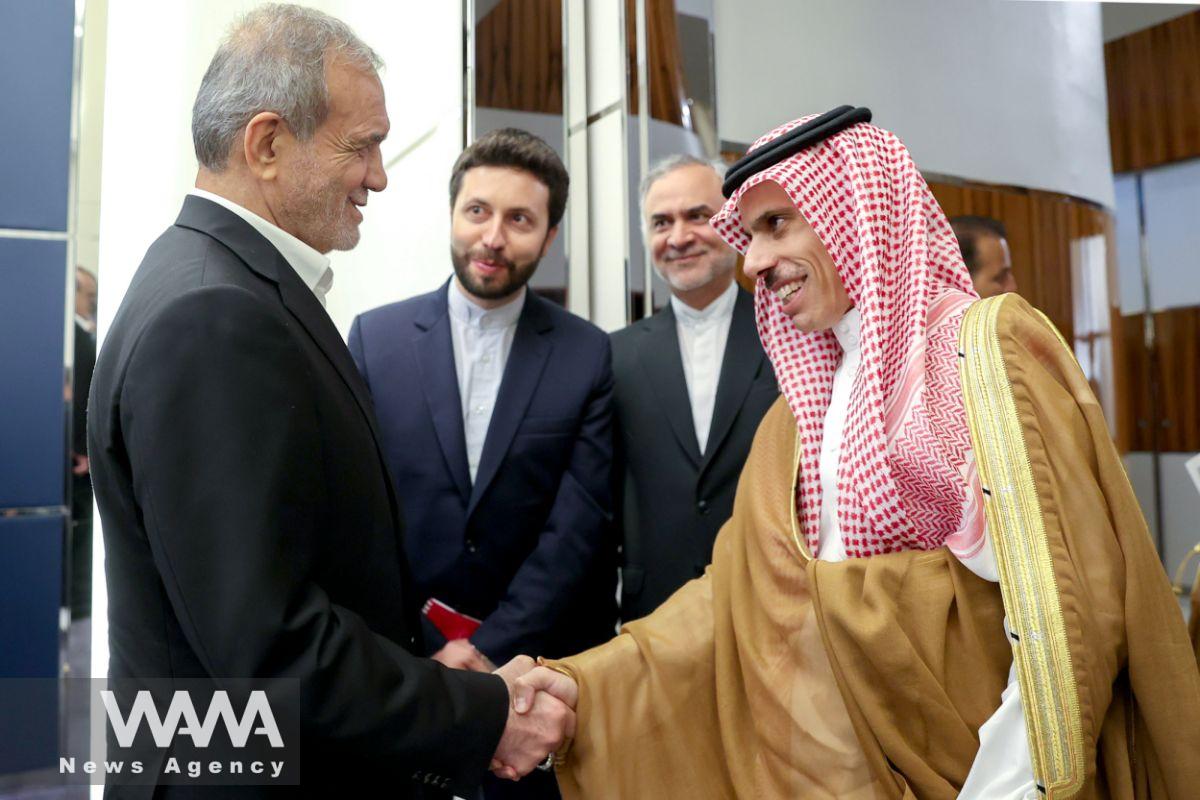Why Did Pezeshkian Not Go to Saudi Arabia?
WANA (Nov 11) – Iranian President Masoud Pezeshkian informed Saudi Crown Prince Mohammed bin Salman in a call that due to “the heavy workload,” he would not be able to attend the summit of Arab and Islamic countries in Riyadh, convened to discuss the Gaza and Lebanon conflicts. Instead, First Vice President Mohammad Reza Aref would represent him at the meeting.
In parallel, Foreign Minister Abbas Araghchi was also absent from the recent Arab and Islamic foreign ministers’ meeting in Riyadh, with Iran’s Deputy Foreign Minister for Legal and International Affairs attending in his place.
While Pezeshkian and Araghchi did not travel to Riyadh, the Saudi Chief of Staff was in Tehran for a meeting with his Iranian counterpart just the day before.

Saudi and Iranian Military Chiefs Meet in Tehran
WANA (Nov 10) – General Fayyadh bin Hamid Al-Ruwaili, Chief of Staff of Saudi Arabia’s Armed Forces, met today (Sunday) with Major General Mohammad Bagheri, Chief of Staff of Iran’s Armed Forces. The discussions focused on expanding defense diplomacy and strengthening bilateral cooperation. Major General Bagheri said that “We are interested in the […]
Exactly a year earlier, on November 12, 2023, the late Iranian President Ebrahim Raisi had attended an emergency joint meeting of the Organization of Islamic Cooperation (OIC) and the Arab League in Riyadh, where he met with Crown Prince Mohammed bin Salman. Raisi became the first Iranian president in over a decade to visit Saudi Arabia amid years of fluctuating Tehran-Riyadh relations.
But today, November 11, 2024, no news has surfaced about an upcoming visit by President Pezeshkian to Riyadh for the summit on the Palestinian issue.
Despite Iran’s emphasis on holding this significant summit, which brings together nearly 57 Arab and Islamic countries, why has Pezeshkian—who previously said he would attend if possible—not seized this chance to meet with participating leaders, including the Saudi Crown Prince, especially when it could have presented an opportunity for dialogue just days after Trump’s return to the political stage? Why has he deferred this chance indefinitely, despite the uncertainties ahead?
This absence is particularly noteworthy as Iran was both a sponsor and advocate for the summit. According to Vice President Aref, before departing for Saudi Arabia, Iran’s Foreign Minister, during a recent visit to Riyadh, had again called for an OIC summit.

Emergency OIC and Arab League Meeting to Address Conflict in Lebanon and Palestine
WANA (Nov 11) – The First Vice President of Iran, referring to Iran’s proposal for an emergency meeting of the Organization of Islamic Cooperation (OIC) and the Arab League, stated that the aim of this gathering is to stop the war and bloodshed in Lebanon and Palestine. Mohammad Reza Aref, Iran’s First Vice President, […]
Is this decision tied to internal political frictions regarding Saudi relations, or does it relate more broadly to diplomatic nuances, such as which capital’s leader visits the other first? Or is it about the status of attendees or, perhaps, Tehran’s deeper concerns over diverging views on the Palestinian conflict and differing perspectives on the Arab-Israeli future?
It seems likely that the non-attendance does not relate to bilateral ties; in fact, Pezeshkian’s recent call with bin Salman may have aimed at preventing misunderstandings. According to the Iranian presidential website, the two leaders expressed mutual satisfaction with current relations.
Iran has consistently advocated for an OIC summit on the Gaza, and later, Lebanon conflicts to rally Islamic countries toward a united stance. In such a context, it’s doubtful that “workload” would prevent Iran’s president from traveling to Saudi Arabia for such a pivotal gathering.
While the summit included Arab heads of state, Saudi Arabia adjusted Iran’s proposal, transforming it into a joint Arab-Islamic summit, which appears to serve specific goals, potentially to position the gathering as a Saudi-led initiative.
Iranian President’s Phone Call with Bin Salman.
The Saudi Crown Prince stated: “#Iran–#Saudi relations are at a historic turning point, and I hope they will reach the highest levels in all areas.”#Bin_Salman #Pezeshkian #SaudiArabia pic.twitter.com/guH8qXBvhA
— WANA News Agency (@WANAIran) November 10, 2024
The main reason for Pezeshkian’s absence likely stems from concerns that this summit could be leveraged to promote solutions counter to Iran’s policies, such as a two-state solution, coupled with a lack of confidence that the summit would lead to an end to the conflict.
This gathering follows the “Alliance for Implementing a Two-State Solution” held on October 30, which saw attendance from around 90 countries, including representatives from Europe, China, and Russia.
This recent summit had already raised questions among regional circles, especially concerning whether a peace summit should prioritize halting the ongoing violence over advancing a two-state solution. Riyadh’s order of events has been questioned, with some arguing that Saudi Arabia should have first focused on stopping the conflict before addressing other issues.

Pezeshkian meeting Saudi Foreign Minister Faisal bin Farhan in Qatar, October 03,2024, President.ir/ WANA News Agency
The two-state solution remains a priority for Saudi Arabia and other Arab countries, who, since King Abdullah’s 2002 peace proposal, have maintained or established diplomatic ties with Israel despite the absence of a Palestinian state.
Some analysts believe that, at the very least, Pezeshkian’s attendance in Riyadh would have allowed him to relay Iran’s concerns about a potential Saudi-U.S. defense pact, recently reintroduced under Trump, directly to the Saudi Crown Prince.
In any case, we’ll have to wait and see if this new Arab and Islamic leaders’ summit will prove more effective than previous OIC summits in pushing for an end to the ongoing conflict or if it will follow a similar path as before.













